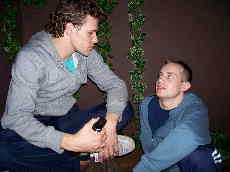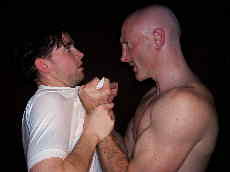By Robert Bain
Boys’ Plays brings together two tales of hero worship between gay males, that leave you wondering who really had the better of whom. The two one-act plays, separately titled Boys’ Play and Extra Virgin, being produced for the first time in Europe by Shamelessboyz, combine remarkably well, flowing like two halves of one whole.
Both are not only about hero worship but also denial – Jack Heifner’s Boys’ Play focuses on two teenagers who insist they are “not queers”, while the apparently more mature characters in Howard Walters’ Extra Virgin must face up to painful secrets in their pasts during an intense one-night stand.
In Boys’ Play we follow two schoolboys on a camping trip in the woods – the cocky and domineering Tom, and his gormless, fawning friend Joe. The raging teenage hormones and insecurities are wittily observed, as when Tom asserts his superiority by stating that he’s six months older and his penis is a couple of inches longer.
 When Joe suggests that Tom’s boasts about sex with girls are exaggerated, he retorts “I took the rubber off and kept it to show you!†This sharp dialogue falters only occasionally due to the adapted American script being delivered in northern English accents.
When Joe suggests that Tom’s boasts about sex with girls are exaggerated, he retorts “I took the rubber off and kept it to show you!†This sharp dialogue falters only occasionally due to the adapted American script being delivered in northern English accents.
The contrast between Phil Price’s over-played, child-like Joe and Matt Firth’s mirthless Tom makes the pair come across like some old-fashioned comedy duo. Price draws a lot of humour from the sexual tension, but is allowed to indulge himself too much, and seems out of depth as the more serious, soul-searching material seeps in.
If anything, the story that develops in Boys’ Play doesn’t do justice to its characters, who are both likeable and carefully drawn. To begin with, the pair’s clumsiness in expressing their feelings says everything, but towards the end, the already poignant script tries in vain to draw more emotion from clichés and grand gestures that end up looking silly.
While the real power of Boys’ Play simmers beneath its surface, Extra Virgin is unflinching – with the two men already writhing in bed as the audience files into the tiny theatre after the interval. The tone is immediately more adult and the whole play is more believable than the first. The casual, matter-of-fact style – especially from Gareth Watkins as Elias – is in clear contrast to Boys’ Play’s more theatrical feel.
 After a familiarly awkward post-sex scene, things take a disturbing turn when Noah proposes an “emotional hook-up”: the two will open up to each other completely, then avoid the pain that they have both learned is inevitable by never seeing one another again. The real, messy story then gradually starts to unfurl, with each reluctant admission leading to an even darker secret, as the two confront lust, lies, cruelty and regret.
After a familiarly awkward post-sex scene, things take a disturbing turn when Noah proposes an “emotional hook-up”: the two will open up to each other completely, then avoid the pain that they have both learned is inevitable by never seeing one another again. The real, messy story then gradually starts to unfurl, with each reluctant admission leading to an even darker secret, as the two confront lust, lies, cruelty and regret.
Like Boys’ Play, Extra Virgin’s well-crafted dialogue occasionally gives way to lazy psycho-waffle, as when Noah defuses a potentially violent moment by posing a question about psychoanalytical theory. But this happens rarely and doesn’t stop the play from packing a serious punch. The visual shock of the explicit opening sex scene is nothing compared to the revelations that emerge later on, and the finale is a satisfying conclusion to this engrossing double bill.
The production continues at the Baron’s Court Theatre until November 5.
Leave a Reply